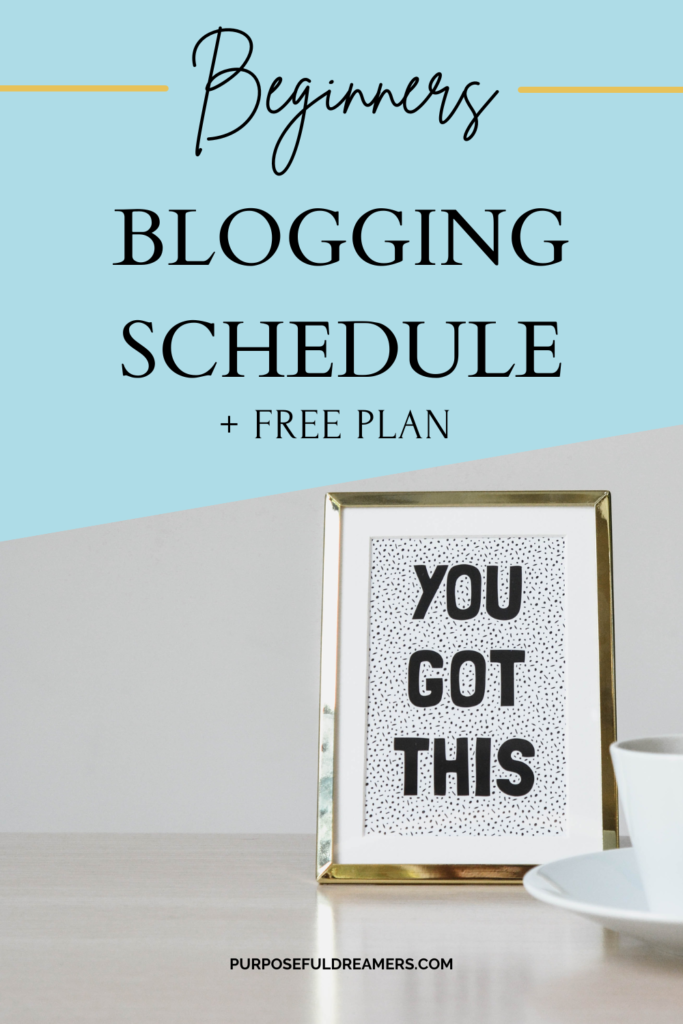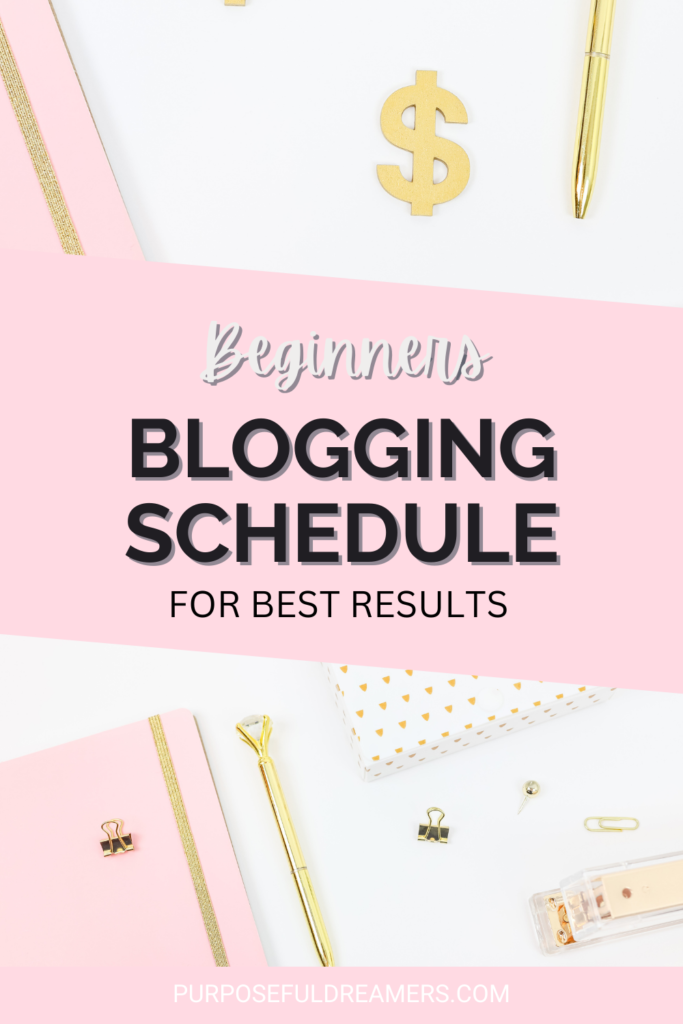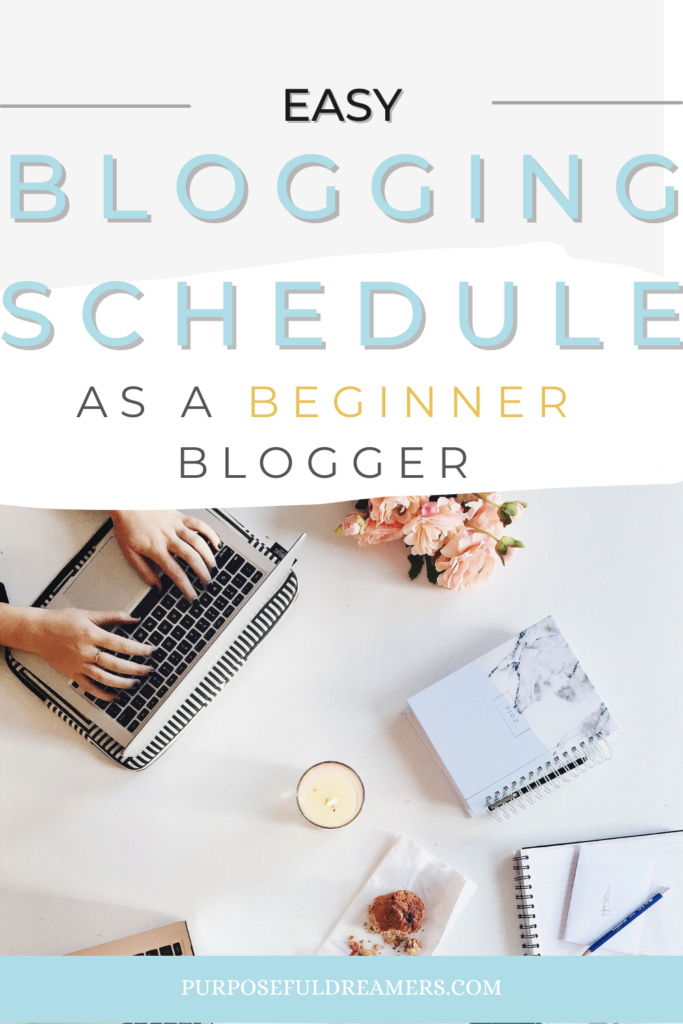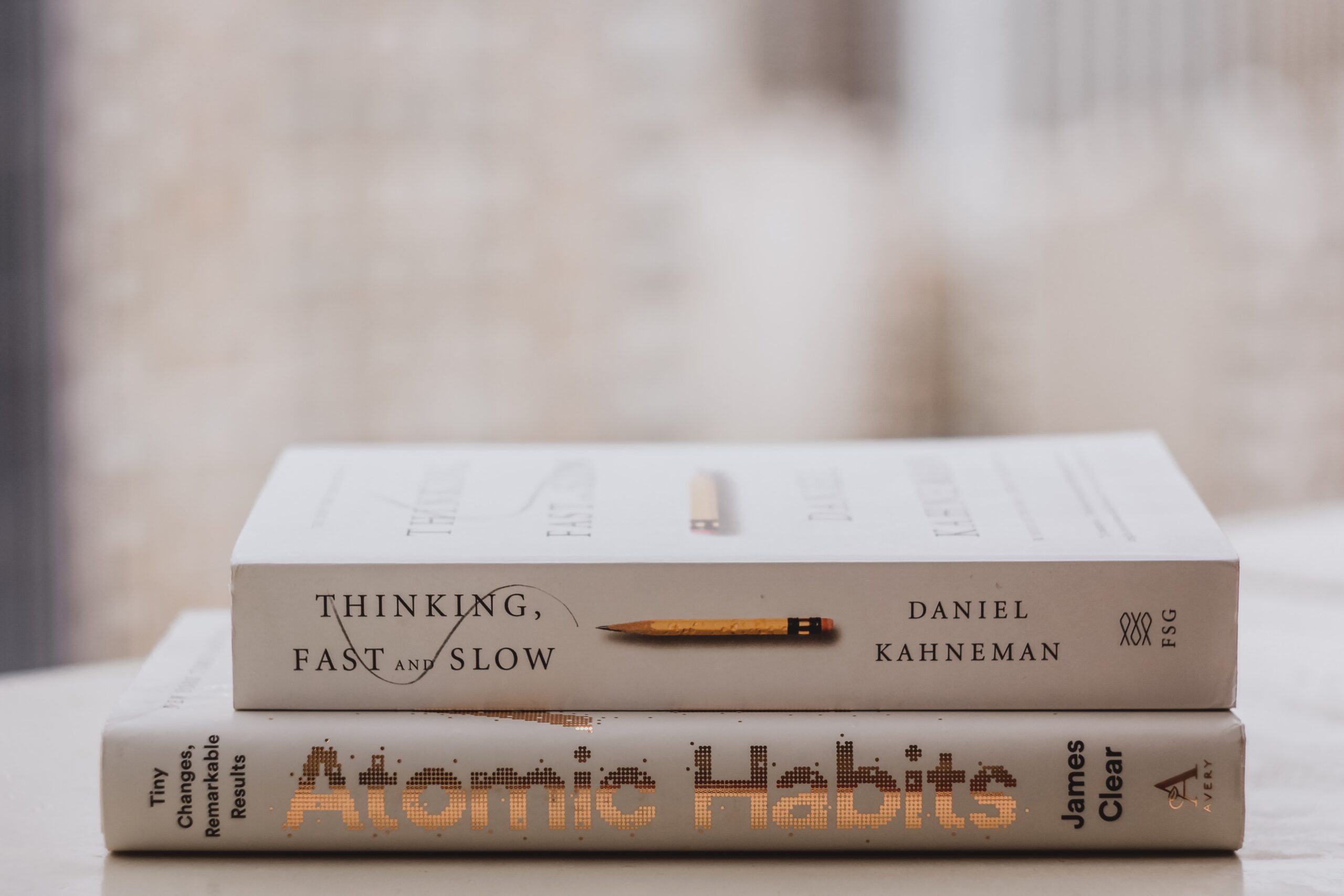If you have a blog that you’ve been pushing to take off, you know that the “to-do” list is endless. Beginner bloggers get overwhelmed by the number of tasks that need to get done – sometimes even before launching their blogs – and have a hard time creating a realistic blogging schedule.
How do I know this? Because I was in your shoes (not once, but twice).
Before launching “Purposeful Dreamers”, I started two other blogs. No wonder you don’t know their names, they were a failure…
I have learned from my mistakes, and now I have quite a lot to say about blogging.
When I decided to re-launch “Purposeful Dreamers”, I had a completely different approach than the other 2 times.
This time, I knew from the beginning what I had to focus on the most – at least if I wanted to become a successful blogger.
Let me tell you…it all starts with your blogging schedule!
In this post, I want to share with you what my current blogging schedule looks like. This schedule allowed me to stay consistent with my blog as a beginner – when I had just a little time to spend on it.
After all, it’s thanks to this blogging schedule that my blog is where it is today, with you reading it. THANK YOU!
This is going to be a pretty long and detailed blog post, so:
- If you have enough time to read it, then grab a cup of tea and get cozy
- If you don’t have enough time to read it all, then I suggest you Pin it and save it for later
How do I stay organized with my blog? Here’s all you need to know!
1. FOCUS ON HIGH ROI TASKS
The first step to creating a successful blog starts with focusing on what matters. Simple, right?
Before you even begin creating a blogging schedule, you need to determine what tasks should be your focus most of the time.
Usually, we refer to them as “high ROI tasks” because they give you the highest results (readers, money, exposure) compared to the inputs (time, energy, resources).
High ROI tasks will differ from blogger to blogger, but they also change throughout the blogging journey. It all comes down to what your goals are.
Let’s give you a couple of examples to get more practical:
- Goal: Earn money through your blog → The high ROI tasks depend on what’s the stream of income you set up your blog for. For example, that could be:
- Creating content that fits affiliate links
- Producing sponsored content
- Creating and/or promoting your services and products
- Goal: Grow your blog traffic → Some high ROI tasks are:
- Learning SEO in-depth
- Optimizing all your blog posts for SEO
- Increasing the number of high-quality backlinks
- Being active on the social media you decided to pursue (I strongly suggest Pinterest!)
As you can see, the activities to achieve the first goal differ a lot from the ones in the second case.
Here’s my first piece of advice: identify your main goal and then determine your highest ROI tasks at this moment of your blogging journey.

2. WRITE HIGH-QUALITY CONTENT CONSISTENTLY
Okay, this one is pretty obvious but still worth mentioning.
Three important questions to ask yourself during your blogging journey, just to make sure that you’re on the right track are:
- What do you want your readers to feel and think when they land on your blog?
- What is the desired impact that your posts should have on them?
- Do all of your posts provide added value to your readers?
If you’re reading this post, I guess that you’re not just running your blog for fun or as a hobby (nothing against the people who run a blog for this reason).
Chances are that blogging is either your business or you’re trying to turn it into one.
In both cases, then you’re not writing just for yourself anymore.
Every post on your website should be addressed and written thinking about your readers. In a broader sense, all blog posts should fall under one of these categories:
- Educational content, to teach something to your readers (E.g. “6 Mindset Shifts that will Change your Life”)
- Entertainment content, to better develop and grow a more personal connection with your readers (E.g. “BuzzFeed”)
- Inspirational content, to make your readers feel inspired and motivated (E.g. “100 Best Motivational Quotes”)
There are two keywords that I would like you to focus on:
- High-quality → You have to give a reason to your readers to either come back or stay a little longer on your website
- Consistency → Your readers won’t trust you – and your blog won’t be successful – if you don’t show up consistently for them (I’ve learned this the hard way)
Unfortunately, it is hard to stay consistent with blogging. Especially if you’re amongst the many beginner bloggers trying to emerge and still don’t have a proper blogging schedule (I had to make that mistake twice to find a solution that would work for me).
So, today I want to give you 2 gifts:
- I believe that every successful blog has to be backed up with a solid blogging plan – that’s why I created this FREE “Blogging Plan” that I used too when developing my re-launch
- To stay on top of your blogging schedule, I’m offering you this FREE Daily Planner – which is recommended to any beginner bloggers
Many beginner bloggers get discouraged and quit because they spend many hours working on their blogs, yet they don’t see any results.
Trust me on this: if you put consistent effort in working toward the right goals, maybe not tomorrow – nor in a week, or a month –, sooner or later you will see the results of your hard work.
3. PROMOTE YOUR BLOG
Surprisingly, beginner bloggers fall into either one of those mistakes:
- They promote their blogs without having enough valuable content on it
- They have tons of high-quality posts that no one knows about
I have already talked enough about being consistent and producing valuable content. So now, I am going to focus on the last option.
I mean…if your readers don’t know about the existence of your blog in the first place, how can they benefit from your content? PROMOTION, PROMOTION, PROMOTION!
Only because you hit the “Publish” button, don’t think that Google will take care of the rest.
Getting your post out there isn’t enough. You have to create awareness. Attract your ideal audience through different channels. Interact with other bloggers when you like their content and show appreciation.
There are many ORGANIC ways in which you can promote new content, such as:
- Social Media channels:
- Facebook – ideal for blogging groups
- Instagram – for younger audiences
- TikTok – to use only if you’re able to turn pieces of your content into a video format
- PINTEREST – this one is a huge YES! All types of bloggers with different niches are on Pinterest
- Guest blogging: helpful technique if you want to share your name out there (keep in mind your niche)
- Networking: if you leave a nice comment on a post that you’ve also covered, why not mention your blog? More resources and more value for the readers!
Extra tip: When starting, choose a maximum of 1 or 2 social media platforms in which you’ll be present.
The blogging schedule for beginner bloggers is already pretty packed, so follow this advice to avoid burnout. Carefully pick the channels where most of your target audience is present, but I strongly recommend you consider Pinterest as one of the social media.
4. INVEST IN LEARNING
Blogging is constantly evolving, and you’ll learn new things along the way. There are many resources to consult out there, and this can create a lot of confusion – especially when two sources say the opposite things.
There are many FREE resources that I’d like to share with you if you’re new to the blogging world.
Here is the list of my favorite blogging tools and resources:
- Trello – for planning content
- Tailwind – for scheduling content on Pinterest
- Canva – for creating thumbnails, freebies, Pins
- Any free source from @thesideblogger
Mind this: you cannot create a perfect blog from the beginning.
There will always be tweaks and improvements to make.
New, more efficient ways to manage your social media will be created.
Other bloggers will express their thoughts in a more distinctive and impactful way than you currently do.
SEO will evolve. There will be always something to learn.
What I’m trying to say is that, at least once a week, you should set aside 1 or 2 hours to look at what’s going on beyond your blog.

5. ADMIN TASKS LAST
The last thing to do is to work on admin tasks. I put this as my last point because, in order of importance, these bring the lowest ROI. Admin tasks comprehend:
- Answering emails
- Updating your social media profiles (picture, bio, etc)
- Modifying your “about me” page
- Reaching out to other bloggers
- Updating old content
- Scheduling social media posts
- Scheduling new blog posts
- Updating and/or deleting plugins
Those are good tasks to do when you don’t have enough time, enough energy, or don’t have anything more urgent and important to work on.
Now that we’ve covered the basic principles you should follow when approaching blogging as a beginner, I will show you how I break these principles down and apply them daily.
The time management technique that I use is called “Time Batching”, for which I group similar tasks in a set slot of time (in this case, days). Let’s dive in!
- MONDAY – Writing day
- 2 to 4 blog posts
- Captions for my social media content
- Emails newsletter
- Brainstorming future ideas for posts, emails, and freebies
- TUESDAY – Marketing day
- Promoting posts on social media
- Being active on Pinterest
- Commenting on other people’s blog posts
- Engaging with my audience but also other accounts
- WEDNESDAY – Content creation day
- Thumbnails creation for Pinterest
- Pinterest Idea creation
- TikTok filming + editing
- Creating freebies
- THURSDAY – Learning day
- SEO tips and tricks
- Reading blog posts
- Watching videos on YT/webinars
- Taking notes on things I want to improve on my blog
- FRIDAY – Research and Scheduling day
- Scheduling blog posts
- Keyword research
- Scheduling social media posts
- Scheduling newsletter
- WEEKEND – Relax and enjoy!
Obviously, there are some tasks that I do daily – such as answering emails, or pinning fresh Pins on Pinterest – but having a specific “theme” linked to each day allows me to focus on what’s most important on that day.

WOW! If you’ve made it so far, great job! It was a long post but, if you’re serious about blogging, you’ll thank me later 😉
For many beginner bloggers, creating a realistic but successful blogging schedule is one of the hardest things to do.
If I had to choose the 3 most important things you cannot leave this website without – I would say:
- Focus on the HIGHEST ROI tasks first (and every day)!
- PINTEREST will be your best friend in terms of promotion!
- Use TIME-BATCHING to boost your productivity!
Now, I can’t wait to hear more about your blogging schedule.
Feel free to share it in the comments below!








Great post!! Thank you!
Glad you liked it 🙂
This was such a great post to read! I’m a new blogger and have been struggling with managing when to do what. Thank you so much for sharing!
I’m glad you found this helpful 🙂